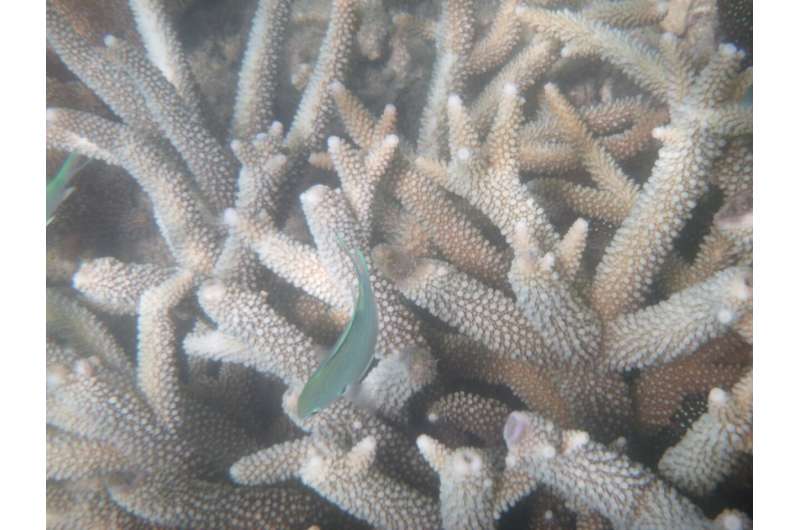Satirical obituary for the Great Barrier Reef undermines climate action

A tongue-in-cheek editorial about the death of the Great Barrier Reef undermined efforts to build action on climate change and amplified conflict, a new study in Media International Australia has found.
Researchers from Griffith University and the University of Tasmania used Google Trends to trace the re-emergence of the idea of a 'dead reef' back to the article "An obituary for the Great Barrier Reef" by Rowan Jacobsen in a 2016 Outside magazine.
"The 'news' of the Reef's demise went viral and the economic and political furor that followed was immense," said Associate Professor Kerrie Foxwell-Norton from the Griffith Centre for Social and Cultural Research and Griffith Climate Action research program.
"The imagined spectacle of a dead reef, triggered by a single article in a niche magazine in America, devolved into a sideshow of climate change politics back home here in Australia.
"The way the reef is communicated about is critical to public understanding and political action on climate change."
Using Google Trends to measure when the idea of a 'dead Reef' occurred in public sentiment and Google News to dissect how the idea was conveyed, the researchers demonstrate how the reported annihilation of the reef was used by different interests for their own ends.
"Politicians, for example, scampered to reassure Australians and the world that the reef was indeed still alive and beautiful," said Dr. Claire Konkes from the University of Tasmania's Institute for Social Change.
"While in the public sphere, climate science deniers and those advocating for climate action collided over the impacts of global warming to Reef health."
Dr. Foxwell-Norton said Australian mainstream news reporting data showed the amplification of this message was generally used to serve political and financial interests to discredit claims for action on climate change and as part of a public platform for the repetition of Australia's 'climate wars,' now centered on the Great Barrier Reef.
"As general audiences struggled to separate the satire from the science, global digital communication networks spread the confusion and climate change deniers in the Australian news media used the confusion to their advantage.
"Tourism industries who are especially reliant on international arrivals, were impacted by this satirical communication as potential visitors took news of the Reef's passing as fact."
The global reach of communication networks makes it easy for messages created in a one context to be misinterpreted and misunderstood in another.
"While satirical representations of climate crisis can cause an emotional response that stimulates interest and action, apocalyptic messages of ecological crisis, like that of Jacobsen's dire reef obituary, can also paralyze action," Dr. Foxwell-Norton said.
"This is particularly unhelpful in an era of climate change denialism and digital media, where audiences are aware of climate change but already perplexed about their ability to respond."
"The greatest impact of the satirical imagining of a dead Reef was to confuse audiences, enflame divisions, harm local Reef communities/businesses and, stall Australian action on climate change, which is so urgently needed."
More information: Kerrie Foxwell-Norton et al, Is the Great Barrier Reef dead? Satire, death and environmental communication, Media International Australia (2021). DOI: 10.1177/1329878X211055852
Provided by Griffith University



















